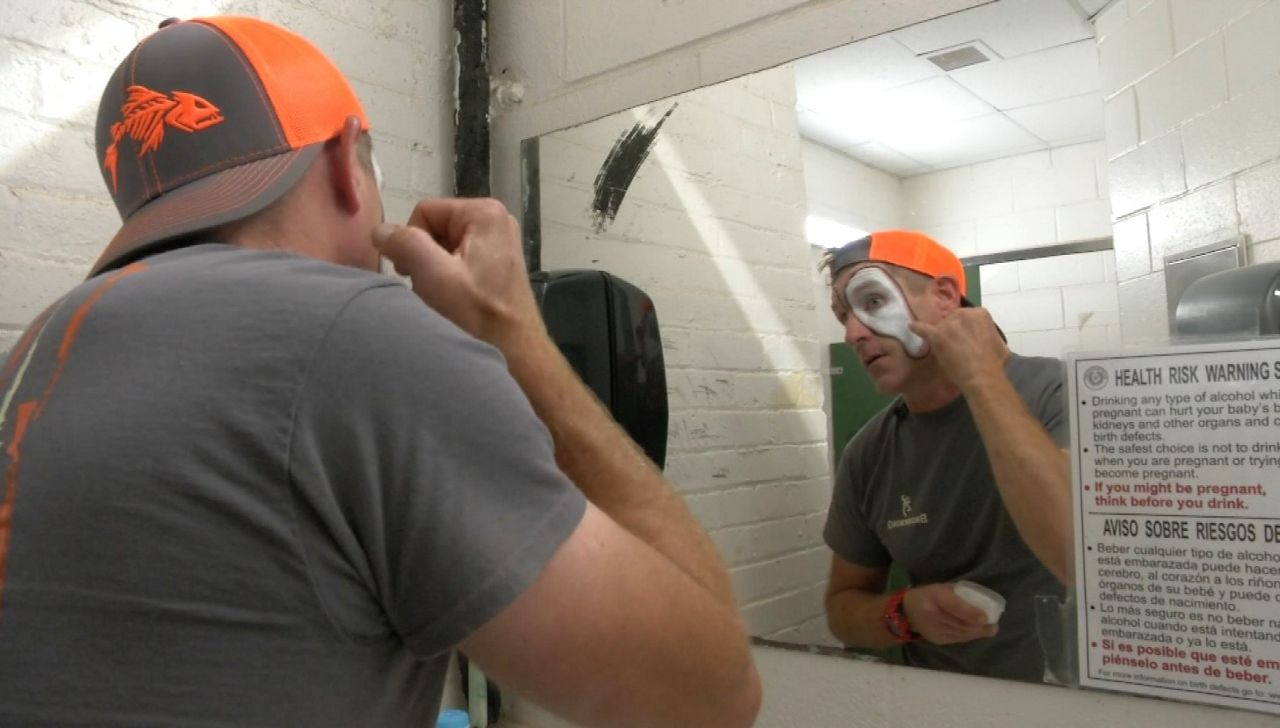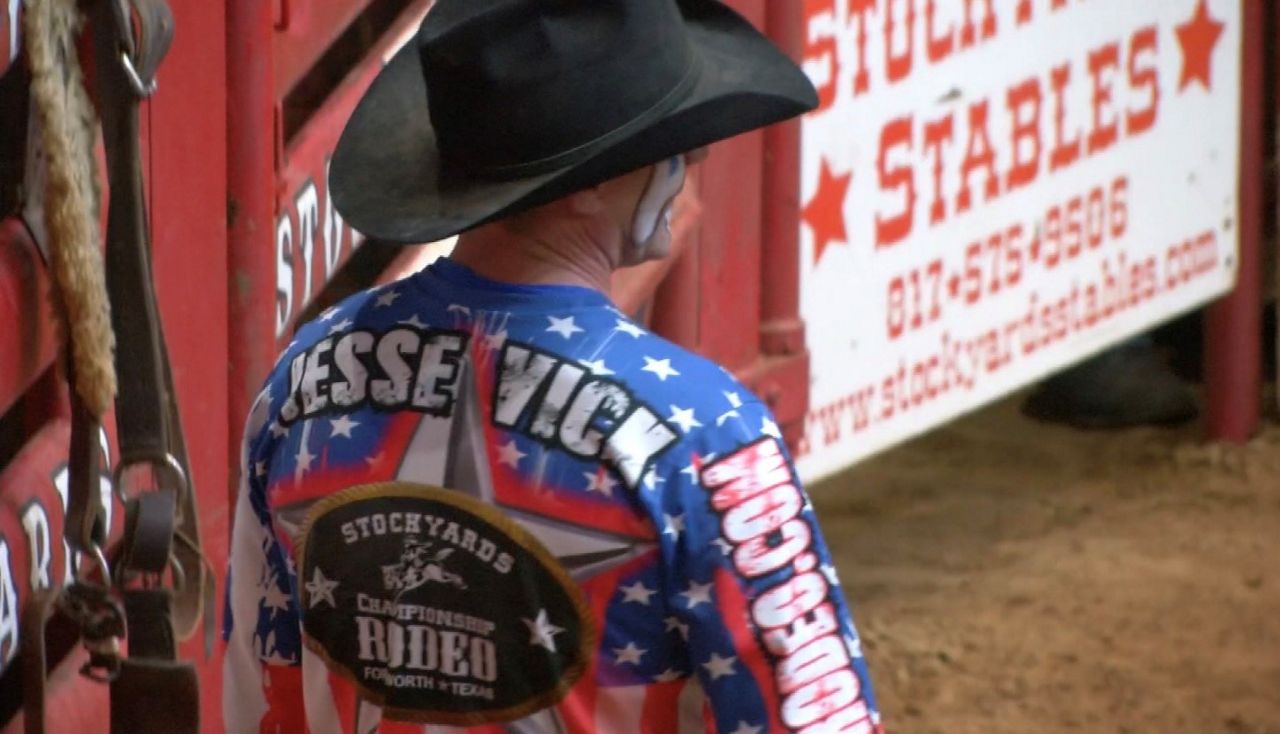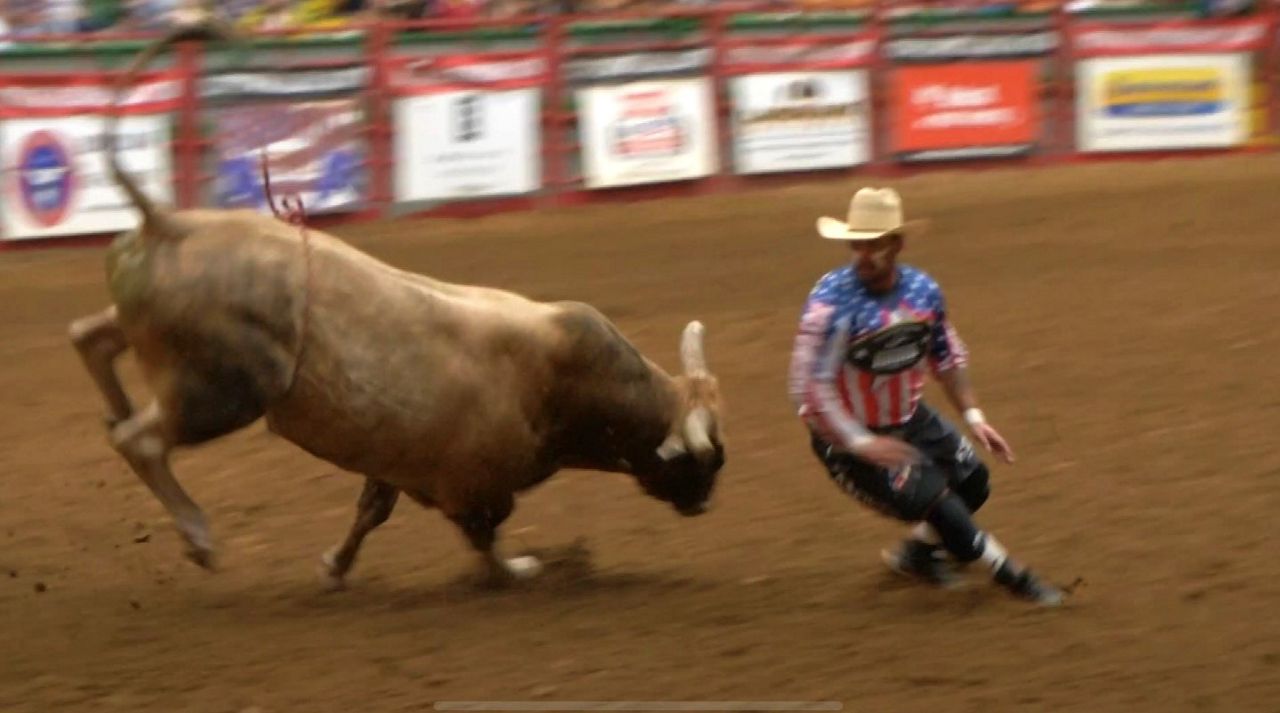FORTH WORTH, Texas – On a Friday night in the Cowtown Coliseum, the crowd is filing in to take their seats around the rodeo arena in the center. In the locker rooms below their seats, competitors put on their cowboy boots and gear as they prepare to bull-ride and calf-rope their way to victory at this event.
What You Need To Know
- Cowboys pull out their makeup kits to put on their “Friday night faces”
- Several writers trace rodeo clowns back to the early 1900s when promoters needed an act to entertain the crowd between events
- The clowns also stepped in to serve as a distraction for the bull when riders fell off and needed to get away
- Rodeo bullfighting itself has become a competition as the fighters fine tune their techniques
In one of the small locker rooms. though, the cowboy boots are replaced with running shoes and the cowboys inside pull out their makeup kits to put on their “Friday night faces.”
“It’s more of a signature,” said Jesse Vick as he spread white paint around his eyes. “Most people, most of the bull riders, they don’t even know what I look like without makeup.”

It’s a signature and a tradition that Vick proudly keeps alive as one of the often “unsung heroes” of the rodeo arena.
Vick is a bullfighter. To the non-rodeo savvy, you may better know his position as the “rodeo clown,” but he says there’s little clowning around in the position these days.
Once upon a time, though, that title fit quite well. Several writers on the topic trace rodeo clowns back to the early 1900s, when rodeo promoters needed an act to entertain the crowd between events. Then, as bull riding became a competitive event in rodeos, the clowns stepped in to serve as a distraction for the bull when riders fell off and needed to get away.
Over the years, the duel act has split a bit as some of the performers now work as barrelmen and continue to don the makeup and costumes, primarily as a sideshow to the main events of the rodeo.
Vick and others like him followed the second path as the distraction role of the rodeo clown became more finely tuned, and he says rodeo promoters and crowds started to see the detail in what they do.
“It became, ‘Hey, let’s see how good they really are,’” said Vick.
Today, rodeo bullfighting itself has become a competition as the fighters fine tune their techniques and try to raise the bar in the role. Many pros have even ditched the makeup for a more serious, sport look, but Vick and many others keep that tradition going while still stepping into the competition.
As he begins taping up for the night to come, Vick recalls getting into the sport when he was younger. He said he came from a rodeo family which had competed in various events for years, but he decided to focus on football instead as a teen. When his time in that sport ran out he looked back to the family tradition and decided it was time to get involved--he immediately saw the role he would fit.
“I wasn’t a roper - none of that; I wasn’t a bull rider - I was too big; so what better to put football into than being a bullfighter?” he said.
He found a fight alright.
Vick’s become one of the most reliable fighters at the Fort Worth Stockyards’s weekly shows. He and his partner in the arena, on any given night, work off of each other’s cues and try to outthink the giant, sometimes 2,000-plus-pound bulls. After all, he said they’ve got a lot of responsibility in their hands. They have to protect the rider, themselves, and even protect the bull from hurting itself--each of the animals is very valuable after all.
“As soon as that bull catches us, we’ve gotta move quick!” said Vick to his fellow fighter as they prepared in the locker room. “You’ve gotta be tough, you’ve gotta be quick, you’ve gotta be smart.”
Their own safety often ends up being the toughest to ensure.
Despite the protective equipment and all of their skills in the arena, bullfighters are frequently injured. Vick said he basically expects to walk away sore tomorrow, and hopefully walk at all.

“I’ve broken both my ankles three times. Ribs, broken ribs are like waking up in the morning, honestly,” he said. “I’ve broken my arm, fingers.”
However, even knowing the unquestionable danger they’re about to face in the arena, the bullfighters’ locker room is filled with laughter, jokes, and ribbing; the guys even yuck it up with the EMTs who they know quite well at this point. Vick says camaraderie in the sport, competitive or not, is a must because it is so dangerous.
“If someone told you, ‘Hey, guarantee you’re going to get in a car wreck today,’ you wouldn’t even get in your car, so we joke around and have fun,” he said.
For the bullfighters, the pain is the price of the glory.
As the arena lights go low and the announcers start the festivities, Vick and his partner each get a spotlight entrance and roaring applause from the crowd. Then they line up fearlessly as bull rider after bull rider take their turns on the bucking giants, and Vick and his team go to work expertly distracting the animals and dodging their attempts to take them down. There are close calls, but he says that’s what makes it so heart-pounding, so addicting.
“It’s an art, it’s all an art,” he said, wiping the sweat from his forehead between rounds.
Another night in the great dirt arena where the Texas-tradition-turned-challenge goes on.



